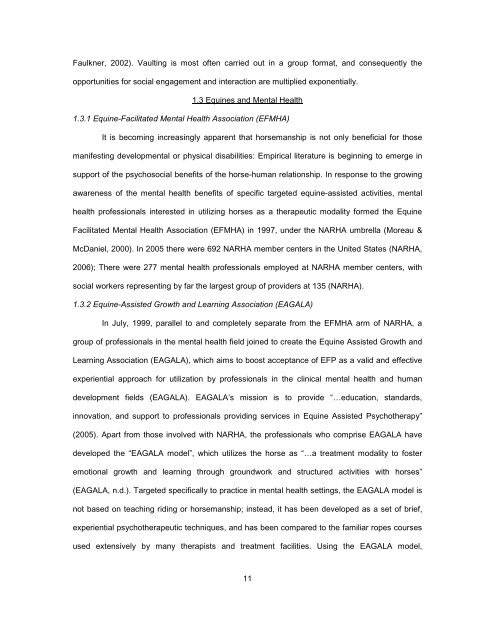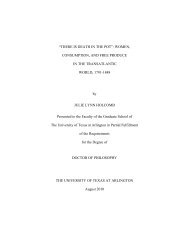A SYSTEMATIC REVIEW OF THE EFFECTS OF PSYCHOTHERAPY ...
A SYSTEMATIC REVIEW OF THE EFFECTS OF PSYCHOTHERAPY ...
A SYSTEMATIC REVIEW OF THE EFFECTS OF PSYCHOTHERAPY ...
You also want an ePaper? Increase the reach of your titles
YUMPU automatically turns print PDFs into web optimized ePapers that Google loves.
Faulkner, 2002). Vaulting is most often carried out in a group format, and consequently the<br />
opportunities for social engagement and interaction are multiplied exponentially.<br />
1.3 Equines and Mental Health<br />
1.3.1 Equine-Facilitated Mental Health Association (EFMHA)<br />
It is becoming increasingly apparent that horsemanship is not only beneficial for those<br />
manifesting developmental or physical disabilities: Empirical literature is beginning to emerge in<br />
support of the psychosocial benefits of the horse-human relationship. In response to the growing<br />
awareness of the mental health benefits of specific targeted equine-assisted activities, mental<br />
health professionals interested in utilizing horses as a therapeutic modality formed the Equine<br />
Facilitated Mental Health Association (EFMHA) in 1997, under the NARHA umbrella (Moreau &<br />
McDaniel, 2000). In 2005 there were 692 NARHA member centers in the United States (NARHA,<br />
2006); There were 277 mental health professionals employed at NARHA member centers, with<br />
social workers representing by far the largest group of providers at 135 (NARHA).<br />
1.3.2 Equine-Assisted Growth and Learning Association (EAGALA)<br />
In July, 1999, parallel to and completely separate from the EFMHA arm of NARHA, a<br />
group of professionals in the mental health field joined to create the Equine Assisted Growth and<br />
Learning Association (EAGALA), which aims to boost acceptance of EFP as a valid and effective<br />
experiential approach for utilization by professionals in the clinical mental health and human<br />
development fields (EAGALA). EAGALA’s mission is to provide “…education, standards,<br />
innovation, and support to professionals providing services in Equine Assisted Psychotherapy”<br />
(2005). Apart from those involved with NARHA, the professionals who comprise EAGALA have<br />
developed the “EAGALA model”, which utilizes the horse as “…a treatment modality to foster<br />
emotional growth and learning through groundwork and structured activities with horses”<br />
(EAGALA, n.d.). Targeted specifically to practice in mental health settings, the EAGALA model is<br />
not based on teaching riding or horsemanship; instead, it has been developed as a set of brief,<br />
experiential psychotherapeutic techniques, and has been compared to the familiar ropes courses<br />
used extensively by many therapists and treatment facilities. Using the EAGALA model,<br />
11
















